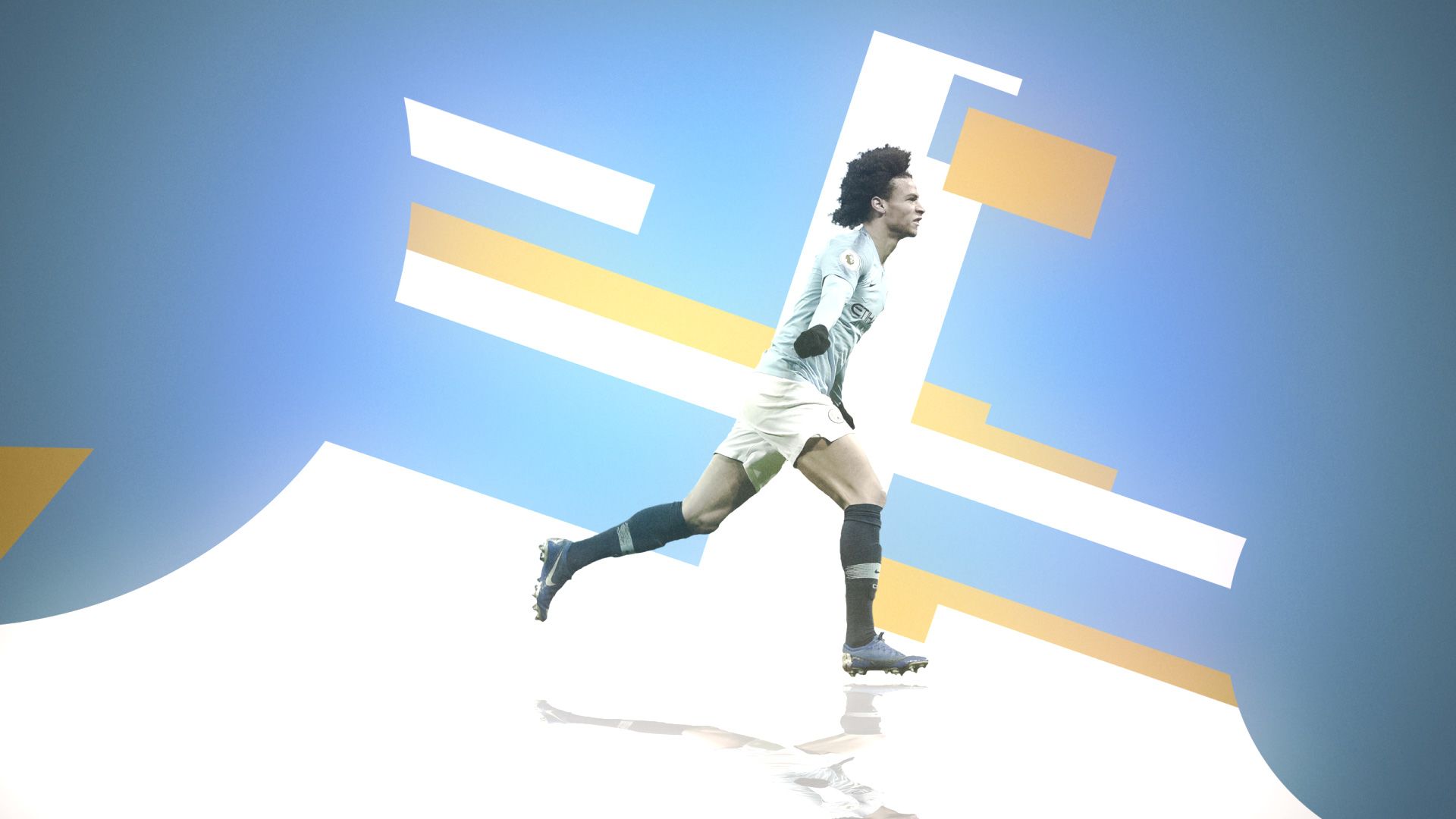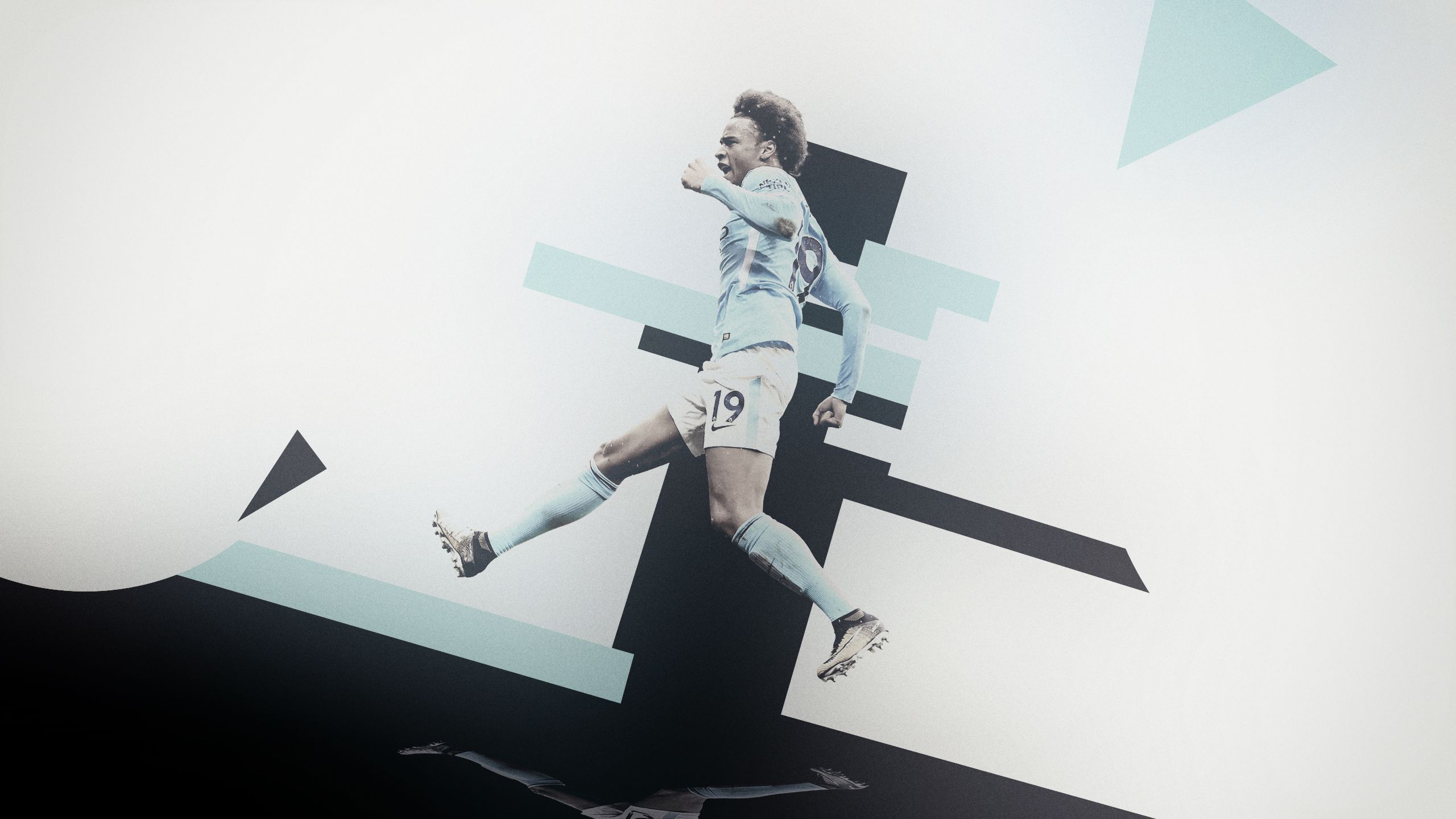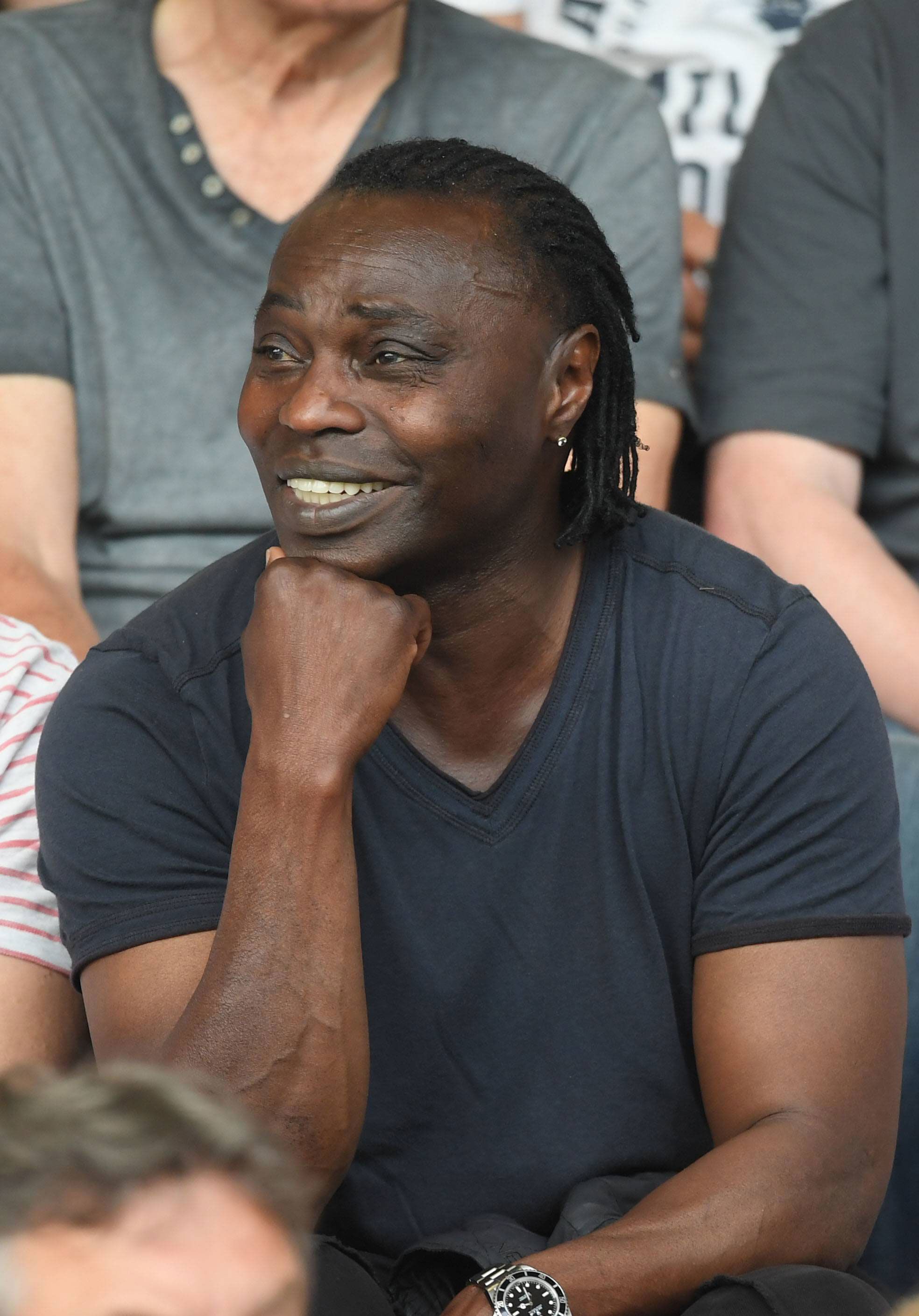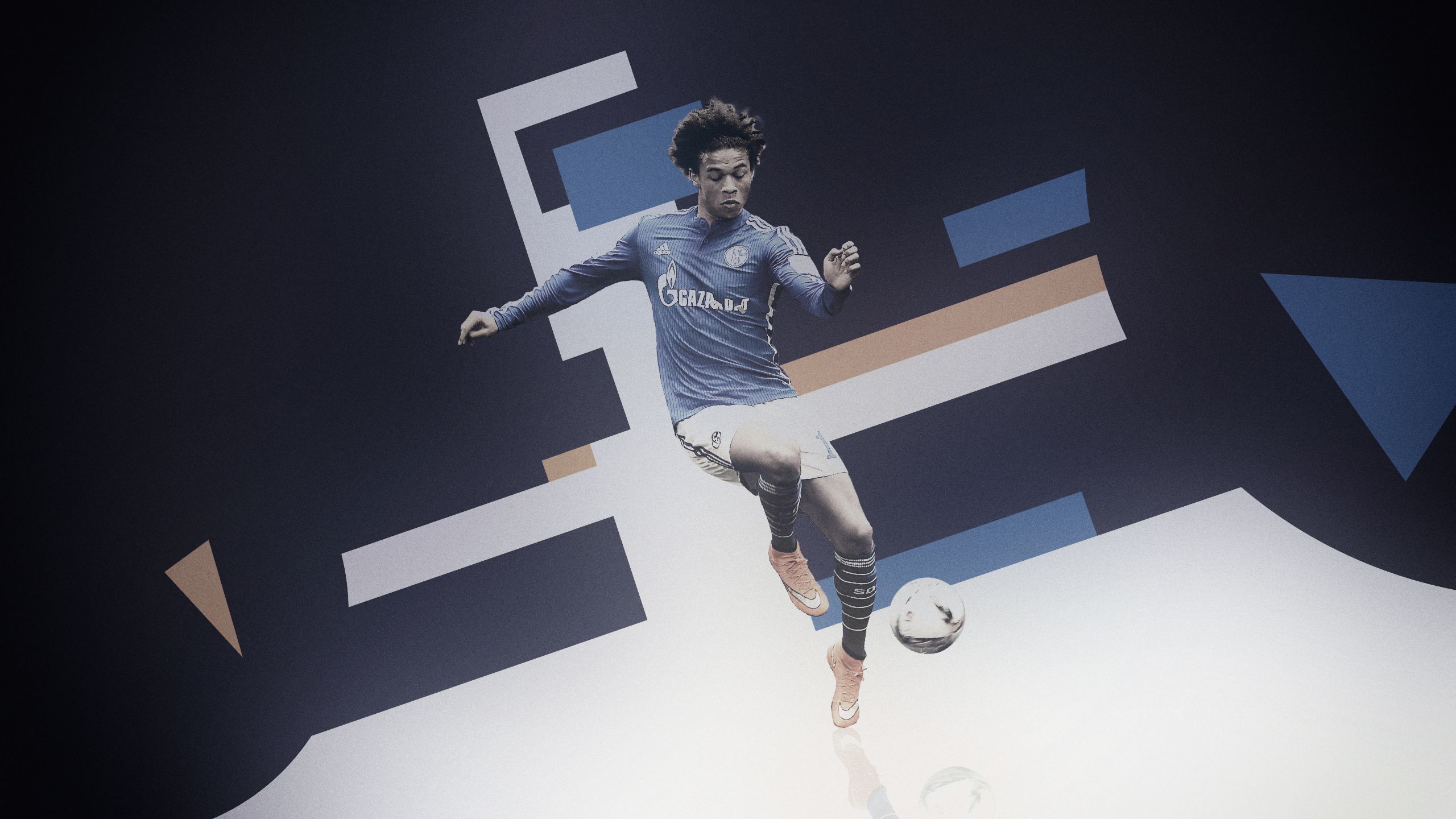Sane's rise to superstardom

Ahead of Manchester City's Champions League last-16 second-leg clash with Schalke, Goal talks to those who know Leroy Sane best to tell the story of the ‘Wattenscheider Robben’, a player genetically programmed for success...
Mother's agility, father's feel for football

“I had to ask for Leroy’s permission first for this interview,” explains father Souleyman Sane on the phone. “I had to ask him whether or not he wants me to talk about him.”
Souleyman was once a professional footballer himself – and not a bad one, either. He played for the likes of SG Wattenscheid 09, Nurnberg and Freiburg. He knows what it’s like to be in the public eye. He knows how off-pitch events can affect you. That’s why Souleyman once made a pact with his son; they would only give interviews or speak to the media if they had agreed as a pair beforehand. It’s an agreement that has worked so far. If father and son stick together, then the family sticks together.

Souleyman Sane
Souleyman Sane
“Leroy is a family man. I know how important his family is to him,” says Sane’s former team-mate Donis Avdijaj. They played together at Schalke for four years, the duo joining the side’s youth academy in July 2011.
“I remember he was there with his older brother Kim,” he continues. Kim also played at Schalke – along with their third brother, Sidi, the youngest.
Kim is now 24 and has hung up his football boots. The 15-year-old Sidi, however, is currently plying his trade with the Schalke Under-16 side. The trio’s journey through youth football was similar. All three of them began their young careers in Bocum-Wattenscheid, where the Sanes grew up. There, Souleyman bought a home following his football career.
Sport played an important role in the Sane family from the very beginning. The boys’ mother, Regina Weber-Sane, was also a professional athlete. As a gymnast, she won bronze at the 1984 Olympics in Los Angeles. And so the Sane brothers were gifted with the agility of their mother, and the football instinct of their father.
The Wattenscheid Robben

Kim, Leroy and Sidi all played football as children in the fields of their neighbourhood near Wattenscheider Lohrheidestadion. Kim had a spell at VfL Bochum and Leroy had a stint at Schalke before they all made the switch to Bayer Leverkusen. Leroy was 12 years old then, and this marked the first time that his usual routine started to change. Though he attended school in Wattenscheid, he had to be driven to and from Leverkusen for training.
But Sane had no trouble at all in adjusting to his new environment.
“He integrated into his new life quickly, and was popular with everyone,” says Frederik Streit, who was Sane’s team-mate. “You could joke around with him and he’d always have a comeback instantly. But sometimes he went a bit over the top.” Streit likes to remember evenings spent in the common room with the Mittelrhein team: “We did a lot of crazy nonsense there.”
Amid all of the fun memories, though, Streit also easily recalls Sane’s incredible talent.
“After all these years, I still have this memory of this feint he always did. He always made the same move with his left foot. Everyone knew about it, but it was impossible to defend. A bit like how it is with Arjen Robben.”
The ‘Wattenscheider Robben’ spent three years at Bayer Leverkusen. In 2011, he and his two brothers returned to the Ruhr area. From then, all of them started playing for Schalke and attended one another’s games. Papa Souleyman, of course, was often there.

Leroy Sane with his brother Kim
Leroy Sane with his brother Kim
“Leroy’s father was very involved in his son’s life. For example, when we were having breakfast the day before a game, he’d tell Leroy: ‘Come on. Let’s go home,’” recounts Pascal Itter, who played with Sane for the Schalke U19s.
Avdijaj has similar memories: “Leroy would always take good care of his little brother and family. His father was really supportive of him, so it was important for him to get advice from someone who’s already experienced it all.”
Getting better, day by day

Compared to his U17 team-mates, Sane was at a disadvantage, build-wise. “He was pretty slim and small,” recalls Avdijaj. In his debut season for the U17s, Sane wasn’t a regular player and only made a fleeting impression on the team. The following year, his output wasn’t much better: one goal, two assists.
The attention was mostly focused on Avdijaj, who, at the time, was considered the team’s greatest talent. He scored 44 goals in a single season. Sane was one of many players, even in the Germany youth sides, who found it hard to make an impact on the team.
“You could see that he had some talent, but I wouldn’t say he was one of the standouts,” recalls Maurice Neubauer, who came up through the Schalke academy alongside Sane and now plays at Homburg in the Regionalliga Sudwest (one of four leagues in the fourth tier of the German football league system).

Donis Avdijaj
Donis Avdijaj
In 2013, Neubauer, Avdijaj and Sane were all promoted to the U19 team from the U17s, the team of legendary coach Norbert Elgert – someone who Sane has named “a very important person” in his life on several occasions. Elgert takes young players under his wing. “Leroy did a great job working under him, getting better with his self-control and self-motivation,” says Itter. “If you didn’t do what Elgert wanted, you’d get a huge boll***ing.”
Current SpVgg Greuther Furth player Fabian Reese was also part of that squad. “The two years under Elgert were my most formative years,” he says. “As long as he’s still a coach there, I can encourage anyone from the Schalke U19 side to take the next step and work with him.”
It was under Elgert that Sane finally got his career going. In a 4-4-2 formation, he was deployed primarily as a playmaker. He scored 10 goals and made 10 assists in his first U19 Bundesliga season, and became his team’s key player.
At the same time, Sane also developed physically, building muscle and getting stronger. “It’s as if he changed overnight,” recalls Neubauer. As a reward for his growth, Sane made his debut for Schalke at 18 in an away game against VfB Stuttgart in the Bundesliga. Not long after, he was called up to the Germany U19s.
Just laughing and have fun

Roman Neustadter was a midfielder for Schalke at the time, and recalls Sane’s professional beginnings best. “He was a bit nervous in his first training session and lost every ball, and he kept getting upset. Everyone laughed and teased him about not being able to control the ball, but we would tell him: ‘If you learn how to do that, then you’ll become a world-class player.’ That worked quicker than expected.”
Sane’s positive nature made him popular with his team-mates, something remembered fondly by all of his former colleagues. “He was just always laughing and joking around,” recalls Neustadter. “Funny answers to stupid questions were his thing,” says Itter, who wasn’t a Schalke native and, like a slew of other players, lived in the boarding school.
Sane was a regular guest in the boys’ dormitories, both before training and afterwards. “In his free time, he’d hang out at the boarding school where we’d be playing Playstation in the common room. He would always say that he was the best, but could never understand it when he’d lose matches.” Sane also liked to listen to music when he wasn’t playing football. “He’s a huge music fan,” he adds. “Always listening to hip-hop and R&B.”

Roman Neustädter
Roman Neustädter
Sane attended school in Berger fields - near the Schalke club grounds - alongside Avdijaj and Reese. “We’d spend school breaks together. Leroy is super easy-going, a funny guy, a joker,” says Reese. “We were close friends and would always goof about,” recalls Avdijaj, laughing. “The sort of things we’d get up to, unfortunately, are not fit to print.”
The fun, however, occasionally got out of hand. In November 2014, at 18, Sane scraped his Mercedes C-class. “I would have been much happier if Leroy hadn’t decided to buy a car straight away, but maybe it’s a lesson that he’ll have learned from,” Papa Souleyman said at the time. He didn’t. Just a few months later, he was involved in a similar incident with his Audi R8.
“When you have a driver’s license, you have this confidence of thinking that you’re this great driver and can handle almost any situation,” says Reese. “But to me, no matter what car you drive, very few will be able to get away without scratching the paint work."
They teased him about the car troubles in training. "We just told him: ‘You can’t drive, just like you can’t control the ball!’”
The most expensive German footballer ever

Incidents with the cars aside, Sane made the promotion from the Schalke U19 to the first team. By the 2014-15 season, he was already part of the senior squad and scored his first Bundesliga goals.
He also made his way to the Bundesliga final with the U19 side against Hoffenheim at the Wattenscheider Lohrheidestadion. Sane was subbed on late in the first half with the score at 1-0 to Schalke, and Schalke ended up winning the game 3-1. “He turned the game around,” Neubauer recalls. “The celebrations after the game were unforgettable,” says Reese, who also came on as a substitute. It was here that Sane marked the end of his youth football career.
Starting from the next season onwards, he played exclusively for the first team. By November, he had made his senior international debut for Germany in a friendly game against France. The summer after that, coach Joachim Low called him up to the side that would travel to the European Championship. By this time, his €50 million move to Manchester City was already in motion. Sane became the most expensive German footballer of all time.
By the age of 20, he was already one of the most exciting players in the world.
Guardiola improves Sane’s first touch

Unlike other young players in his position, Sane had no trouble adapting to his new environment. Just like in Leverkusen, Sane’s positive nature and good social skills made adjusting to his new life much easier.
“He felt at home in Manchester right from the start, and his friends would visit him as well,” said Neustadter, who is still in regular contact with Sane. “When I was playing against Manchester United for Fenerbahce in 2016, he visited me at my hotel.”
For Sane, coach Pep Guardiola’s encouragement and support was crucial in helping him settle in to his new life in the Premier League. “Leroy has done everything right. He’s signed for a club with a coach who’s great with developing players and working with them individually. Guardiola’s even managed to improve Leroy’s first touch,” says Neustadter.
According to journalist David Mooney, who covers Man City for the BBC and ESPN, Guardiola is like a “father figure” to Sane. His father Souleyman, his youth coach Elgert, and now Guardiola. These are the most important people in Sane’s career.
Despite the lucrative transfer fee, Guardiola gave Sane time to adapt to life in the English game. At first, he seemed like an inexperienced rookie playing the professional men’s game. "He looked out of place, a bit naïve, and needing a lot of guidance," Mooney says.
Sane was given his first start in a game in mid-October. It wasn’t until December that he started to make his mark, however, scoring in a 2-1 victory against Arsenal. The score was 1-1 at half time. “This goal marked the real beginning of his time at Man City,” remembers Mooney.
It was in the second half of his debut season that Sane established himself as a regular in Guardiola’s side. He remained a key player from them on, during a season where Man City lifted the Premier League title and Sane was voted the best young player in the league. Everything was so quick. Just like Sane. In a game against Chelsea, Sane ran 35.48 km per hour. It was a Premier League record.
From shock and horror to elation

For years, Sane had enjoyed success after success – and then came June 4, 2018. “Bernd Leno, Jonathan Tah, Nils Petersen,” said Germany coach Low, “and Leroy Sane.” Low barely had time to finish his Espresso when he was inundated with widespread fury and indignation. Low had snubbed Sane from his final 2018 World Cup squad in Russia.
“I wrote to him: ‘Cheer up. It doesn’t make sense to anyone,’” says Neustadter. In Sane’s native Germany, they were dumbfounded by Low’s decision and couldn’t make sense of it – even more so in his adopted home of England.
Mooney recalls the “shock and outrage” over the decision in England. “The fans were confused, and the media was indignant. Usually, they’re only interested in the England national team, but once this news broke it put everything else on the back-burner,” says Mooney.

The overwhelming reaction to the snub shows just how important Sane has been in his first two years in England. “Everyone was wondering how the best young player in the Premier League could not earn a call-up to Germany’s World Cup squad?” It has been alleged that his absence from the Germany team that competed in the 2017 Confederations Cup in order to have nose surgery may have played a role.
Meanwhile, in Manchester, sentiment around the city went from shock to happiness during the World Cup. “Many City fans were happy about Germany’s disappointing World Cup performance because they felt that it meant justice for Sane,” says Mooney. Additionally, fans were hopeful of Sane getting well-earned rest ahead of the start of the new Premier League season.
Just let him do his thing

He wasn’t in great shape, however, because he wasn’t physically tested over the summer. In his first Premier League games, Sane was subbed onto the pitch late. In the fourth game, he was missing from the squad entirely. “He hasn’t properly prepared for the season. He’s not fit to play yet,” said Guardiola at the time. An attitude problem regarding Sane was also touted, in the same way that it was said to have contributed to his World Cup omission.
“He’s always been criticised for not working hard enough defensively at City,” says Mooney. “But then of course, that might make you think that he’s not generally the most eager one at training.” It was a tough couple of weeks for Sane who, for the first time in his career, was being questioned – not just by his coaches, but also by the fans.
Meanwhile, Sane welcomed his first daughter. “That forced him to mature more as a person,” says Neustadter, who also recently became a father. “When we speak to each other, he talks about how much he enjoys spending time with his child. A lot of our conversations revolve around our kids, and we send each other photos. His daughter looks exactly like him – and my son looks more like my wife.”
Eventually, Sane rediscovered his form for his club. He has scored eight goals and made 10 assists since his brief period of struggle, including a crucial strike in the 2-1 win against title rivals Liverpool. “You just have to let him do his thing,” says Neustadter. “People should cut him some slack. Whenever he seems to take one half-step back, he takes two strides forward.”
And at the age of just 23, it is frightening to think how many more strides forward this superstar could take in his already brilliant career.

